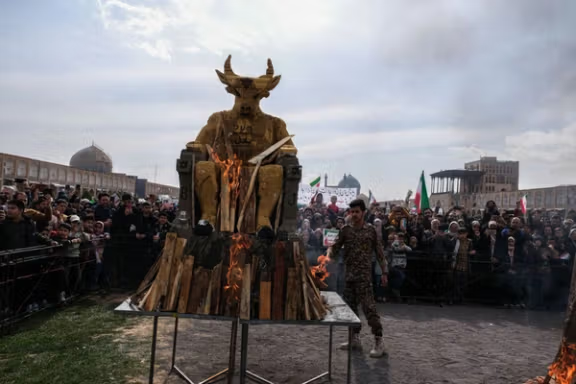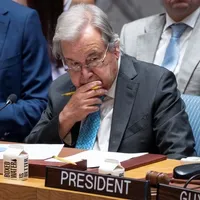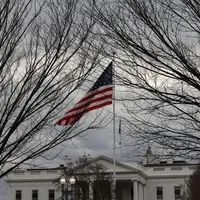Iran’s president under fire as economic malaise buries campaign pledges
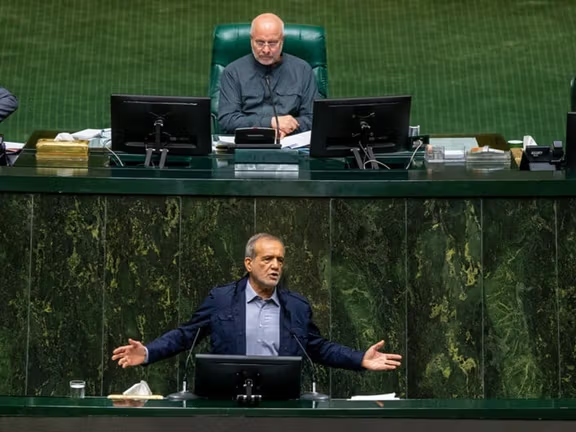
Iran's President Masoud Pezeshkian is coming under growing pressure for what critics call his failure to match tough talk on economic reform with concrete action.
Iran International

Iran's President Masoud Pezeshkian is coming under growing pressure for what critics call his failure to match tough talk on economic reform with concrete action.
The pressure comes amid rising inflation, stagnant growth and deepening shortages of energy and water that have strained public patience.
Experts warn the situation could deteriorate further next year, when the full impact of renewed UN sanctions triggered by European powers is expected to hit Iran’s already fragile economy.
Economist Morteza Afghah told the moderate outlet Fararu on November 12 that Pezeshkian’s call for eight-percent annual growth—echoed by Supreme Leader Ali Khamenei—was “unattainable even without the war with Israel and Europe’s snapback sanctions.”
He said Iran’s fifth development plan had already fallen far behind schedule and criticized Pezeshkian for repeatedly insisting that “major economic problems should be solved” without offering specifics.
“Which of the people’s problems can be solved by repeating that over and over?” he asked.
'Wasteful'
Conservative commentator Vahid Yaminpour made a similar point in a televised debate with a member of Pezeshkian’s media team, saying the president had invoked the country’s economic malaise nine times in less than a week without offering a semblance of a solution.
One such instance came earlier that day, when Pezeshkian criticized the large annual budgets allocated to organizations he said served no useful purpose.
“Start cutting those budgets from my own office,” he told lawmakers, noting that the presidential office employs nearly 4,000 staff, though he believes it could function with 400.
Economist Mehdi Pazouki urged the president to move beyond rhetoric and impose discipline on government spending, highlighting the proliferation of parallel bodies performing overlapping tasks.
“The irregular expansion of the government is one of the main reasons for the rising inflation rate,” he told Fararu. “Without solving this problem, it will be too difficult to overcome inflation.”
Pazouki also ridiculed Pezeshkian’s pledge to deliver a “budget without deficit,” calling the assertion a “joke.”
'Unaware'
Last month, even the conservative establishment daily Jomhouri Eslami advised the president: “Cut off the budget of organizations that have no achievements. The only thing they do is act like devoted disciples of those who fund them.”
Such criticism has been leveled at every administration, and Pezeshkian appears no more capable—or willing—than his predecessors to confront it. But he is also developing a growing PR problem.
During Pezeshkian’s parliament address on Tuesday, speaker—and elections rival—Mohammad Bagher Ghalibaf told the president that his economy minister Ahmad Meydari and his spokesperson Fatemeh Mohajerani did not grasp basic economic concepts.
Pezeshkian admitted he was unaware of what his own spokesperson had told the nation.
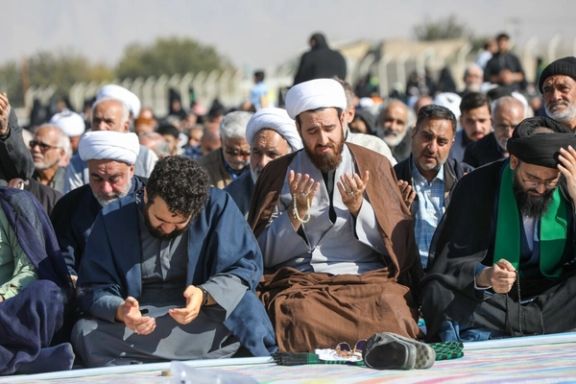
An Iranian Grand Ayatollah has urged the faithful to perform traditional Islamic prayers for rainfall as a worsening drought across the country has caused water shortages and threatens to eventually make the capital Tehran uninhabitable.
Grand Ayatollah Abdollah Javadi Amoli, a Shi'ite religious authority based in the holy city of Qom, said during his weekly ethics session on Wednesday that Islamic tradition recommends the so-called salat al-istisqa, which he described as a prayer for water in all forms, not just rain.
“This prayer, meaning asking for water, is not only for requesting rain but also for the abundance of water in wells, springs, and underground sources,” he said.
Multiple cities in Iran have held or scheduled rain-seeking prayers this week in response to a dramatic drop in rainfall and depleted river and reservoir levels.
In Tehran, the prayer will be held on Friday at 15:00 at the shrine of Imamzadeh Saleh Shrine in north Tehran, led by Ayatollah Seyyed Jamal al‑Din Din Parvar according to state media reports.
In Qom in central Iran the ceremony is scheduled for Friday morning at the Grand Mosque, as announced by provincial officials.
In Mashhad, in Khorasan Razavi Province, the country’s second-largest city and a major religious center with around four million residents, the prayer ceremony was held on Thursday.
Last week, the head of the Mashhad Water and Wastewater Company said water reserves in the city’s dams have now dropped to below 3 percent of capacity.
In Qazvin Province, the prayer ritual was performed on Monday, according to IRGC-affiliated Tasnim.
“The prayer for rain is an opportunity for hearts to return to God, to repent for shortcomings, and to recall hope and humility. When people pray with pure hearts and unity, divine mercy revives the earth,” Tasnim quoted Ayatollah Hossein Mozaffari, the Friday Prayer Leader of Qazvin, as saying about the ceremony.
Iran is now facing one of its most severe shortages in decades, with major reservoirs and dams nearing depletion.
President Masoud Pezeshkian said this month that if rain does not arrive before December, water rationing in Tehran would be needed.
Officials say the city of more than 10 million may be rendered uninhabitable if the drought persists. "Even if we do ration and it still does not rain, then we will have no water at all. (Residents) have to evacuate Tehran," Pezeshkian declared in a speech.
Last week, Iranian officials warned that water rationing could soon begin in several major cities, including Tehran, Mashhad and Isfahan, as reservoir levels fall to their lowest in decades amid a sixth consecutive year of severe drought.
Experts say the crisis is the culmination of decades of environmental mismanagement and overexploitation of resources.
Despite repeated warnings from experts over the years, Iran’s water management system has focused on building dams and drilling deep wells instead of investing in and maintaining infrastructure, often blaming the crisis solely on declining rainfall.

The debut of Tehran Fashion Week, held as part of Tehran Design Week, has set social media abuzz as the officially sanctioned fashion on show looked nothing like its past editions which extolled Islamic modesty.
For decades, Iran’s Public Culture Council and the National Foundation for Islamic-Iranian Fashion and Clothing have strictly overseen what they call “chaste attire.”
Tehran held fashion events in 2014 and 2015, where the designs were limited to “modest fashion”—long coats, scarves and loose forms approved by authorities. No later editions followed the events due to the official denial of permits.
This year’s revival of Tehran Fashion Week was folded into Tehran Design Week, a government-approved initiative showcasing design, furniture and art. Yet despite official oversight, photos and videos showed a strikingly freer atmosphere.
Some female models appeared at the events without headscarves, wearing tight-fitting western-style outfits, and many visitors ignored the mandatory hijab altogether. Women were seen in some social media videos walking bareheaded through the galleries in jeans and dresses.
The contrast is shocking to conservatives who have long treated fashion as a state-controlled domain. Yet for many Iranians, it simply reflects what the streets already look like after nearly two years of weakening hijab enforcement.
Private runways and changing tastes
Bita, a Tehran resident, told Iran International that private fashion shows have quietly flourished in major cities in the past two decades. “They are often underground, mixed-gender, and without hijab,” she said. “The clothes are usually exclusive and extremely expensive—far beyond what ordinary people could afford.”
The social shift since 2022, she added, has reshaped the industry itself and these private fashion events.
“The hijab barely exists anymore in many places,” she said. “Designers who once made luxury scarves and manteaux have turned to new lines because their former clients—the wealthy women who followed fashion—have mostly abandoned the hijab. Only a small group of very rich religious women still buy such expensive clothing, and their taste is totally different.”
Bita said she saw online ads for the Design Week fashion section, held at a well-known Tehran gallery, though she didn’t attend. “But my friends who went say it largely looked like seriously testing limits.”
Cultural paradox
Earlier this year, several clothing sellers at Tehran’s Grand Bazaar were prosecuted for hosting a women’s fashion show in which models appeared without scarves or with hair visible on the red carpet. Officials accused them of “violating public morality”, and their shops were shut down.
Independent news website Rouydad24 published a commentary published an analysis arguing that clothing in Iran has become not just a cultural or social question but a political and even security issue.
“In a country where just a few years ago shop mannequins were banned, stores were closed for selling open-front manteaux, and a small fashion show at the Bazaar caused a scandal," the commentary pondered, "how can Fashion Week possibly align with the realities of society?”
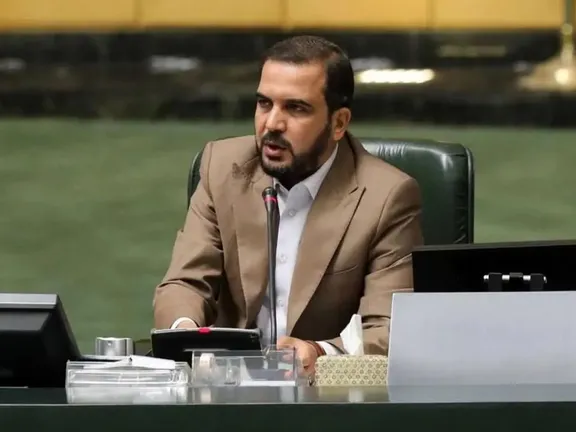
An Iranian lawmaker on Wednesday accused senior officials of nepotism and corruption after a 20-year-old student set himself on fire when municipal workers moved to demolish his family’s food kiosk.
MP Mojtaba Yousefi, who represents Ahvaz, the city where the incident occurred this week, said officials “must face legal consequences” if found negligent, blaming what he described as the system’s deeper rot.
“Just as they can secure consultancy jobs in petrochemical and oil companies for their friends and family members,” the member of parliament from the oil-rich province said, “they should also try to find work for the unemployed youth of Hoveyzeh, Bagh-e Malek, Susangerd and Khuzestan.”
“Some ministers and vice-presidents receive salaries from two positions—hundreds of millions of tomans—so if they can arrange that, surely they can create jobs for our jobless young people,” he added.
Yousefi’s comments came amid mounting anger over the death of Ahmad Baledi, who suffered burns to 70 percent of his body and died Tuesday at Ahvaz’s Taleghani Hospital.
Witnesses said municipal agents had arrived without warning at the family’s kiosk in Zeytoon Park. His father told the reformist Ham-Mihan newspaper that when he begged for an extension, one official mocked his son—“Should I give you a lighter? Matches?”—moments before Ahmad set himself ablaze.
Enquiry
Ahvaz’s prosecutor later said the municipality had acted “unilaterally and at an inappropriate time,” suspending the district mayor and the municipal enforcement chief.
President Masoud Pezeshkian has ordered an investigation and sent condolences to the family.
The tragedy has fueled wider outrage over joblessness and inequality in Iran’s oil-rich southwest, where many rely on informal work to survive.
Another Ahvaz lawmaker, Mohammad Amiri, blamed “personal connections rather than regulations” for the city’s chronic mismanagement.
Authorities have since arrested several citizens who wrote about the case online and restricted access to the burn hospital, signaling a desire to contain unrest. But Yousefi’s unusually blunt remarks suggest growing unease within Iran’s conservative establishment itself.

As Iran’s capital Tehran endures its worst water crisis in living memory, few recent global cases offer clearer lessons than Cape Town in South Africa in 2018.
The city’s narrow escape from “Day Zero” offers a workable blueprint for how Tehran could still avert a breakdown of its own.
President Masoud Pezeshkian underscored the urgency last week with one of the bluntest warnings any Iranian leader has issued: without rain, Tehran may one day have to be evacuated.
Tehran typically receives 50 to 60 millimeters of rain in October and November. This year it has had none, and forecasts offer little hope.
Utility officials have called the shortage “unprecedented,” stressing that the president’s warning is “serious” and that the city “no longer has any water for excess consumption.”
The picture is stark: a megacity entering winter with no meaningful rainfall, groundwater in freefall, and consumption habits far beyond its ecological limits.
How Cape Town pulled back from the brink
Cape Town, a city of four million, endured the worst drought in four centuries beginning in 2015, when winter rains fell to less than half their long-term average for three consecutive years.
By 2018, officials warned of “Day Zero” — the moment when reservoirs would become too low to keep water flowing.
Fear spread quickly: queues for bottled water, soaring tanker prices, and social tension. But instead of losing control, city authorities responded with an unusually disciplined strategy built on strict demand cuts and complete transparency.
The impact was dramatic. Water use fell by more than 55 percent in under two years, from 1.2 billion liters per day to about 500 million.When rains finally returned in 2018, the reservoirs refilled. But the deeper lesson endured: transparent, collective action can shift behavior on a massive scale.
High use, high leak
Average household use in Tehran is 250 to 300 liters per person per day — roughly double that of many developed countries. Nearly one third of the city’s water disappears through leaks in its aging network.
Yet policy continues to rely on large-scale water-transfer projects that postpone, rather than resolve, the crisis.
Decades of over-pumping have pushed Tehran’s aquifers into an annual deficit of roughly 130 million cubic meters, with cumulative losses over forty years approaching 5 billion.
Southern districts now face accelerating land subsidence, which Iran’s Geological Survey warns poses “a direct threat” to the city’s infrastructure.
Once aquifers collapse, they cannot be restored.
What can be done?
Cape Town turned fear into a turning point. Tehran has yet to begin that kind of honest conversation. Years of distrust between state and society have made public cooperation far harder to mobilize.
Drawing on Cape Town’s experience, five measures stand out as immediately actionable for Tehran
Tehran can avoid a Day Zero with concrete, credible action. The window is still open—but barely, and not for long.

Iranian state TV is facing backlash for criticizing a footballer and his wife as immoral even after it was mute about a scandal over the daughter of a top official's revealing wedding dress last month.
The controversy began when a short video produced to mark the wedding of Malavan football club captain Saeed Karimi — showing the couple in his club’s uniform in romantic football-themed scenes at an empty stadium — was leaked on social media.
The case again thrusts women and public morality into the public discourse of the nearly fifty-year-old Islamic theocracy even after authorities this year backed off enforcing strict veiling laws in a likely bid to avoid protests.
Karimi's wife Zahra appeared variously in a the shorts and t-shirt of a football uniform and briefly wearing a baseball cap but at other times without the theocracy's mandatory Islamic head covering. In one brief scene the pair tumble into bed laughing.
The footballer said the video had been shared without his and his wife’s consent and asked users to delete it.
'What next?'
However, state TV presenter Rasoul Mehrabani devoted several minutes of live airtime to accusing the couple's video, calling it shameful, indecent disgraceful.
"If we do not stop this, if we do not stop these indecencies, what will happen tomorrow?" he said, inviting authorities to intervene.
Shortly after, judiciary-affiliated outlet Mizan, quoted provincial prosecutor Seyed Kamaleddin Mousavi as saying they had opened a case in connection with the circulation of a “video contrary to public decency” attributed to a Malavan player.
He said initial investigations showed the clip had been filmed in the northern city of Sari and released by one of the individuals involved in filming it.
Mousavi added that the player appeared before judicial authorities to file a complaint over the unauthorized publication, and that the case has since been transferred to the another prosecutor’s office for further review.
Federation reaction
Amid the controversy, the Ethics Committee of the Football Federation of the Islamic Republic of Iran announced on Tuesday that Karimi had been summoned for questioning.
The committee, a judicial body within the federation labelled by critics the “morality police of football,” has previously taken action against players who made critical comments about political or social issues.
This included those who expressed solidarity with protesters during the nationwide protests sparked by the death in morality police custody of 22-year-old Mahsa Amini in September 2022. Authorities quashed the demonstrations with deadly force.
Support for Karimi
Iranian social media users largely defended Karimi, calling the clip harmless and saying the outrage from state TV and hardline media was misplaced.
The controversy also sparked accusations of double standards, as users compared the reaction to Karimi’s video with the official silence when a video of the wedding of a top security official's daughter leaked last month.
Ali Shamkhani is a senior advisor to Supreme Leader Ali Khamenei and the footage showed his daughter without a hijab and in a Western-style white wedding dress with a plunging neckline.
“Why is Saeed Karimi’s video criminal, but not Shamkhani’s daughter’s?” one user wrote — a question that quickly spread across social media. Another highlighted that Karimi’s wife’s outfit was “far more modest,” while one joked, “If she had worn longer socks or a hat, even the most zealous critics would have stayed quiet.”
'People vs. state'
Fellow footballers also showed support for Karimi and his wife in posts on Instagram.
According to Tehran-based Etemad daily, Mehrabani’s six-minute tirade was filled with vulgar language that many described as “offensive and disgusting.” The paper said his comments drew far more attention to the clip, which had initially gone largely unnoticed.
Etemad said that the video was no different from countless romantic couple shoots posted on Instagram, questioning the mindset behind the presenter’s reaction.

Ehsan Akbari, sports editor at Iran International said the episode revealed a divide between the public and the Islamic Republic’s mindset.
“This (public support for Karimi) shows how much society is standing against the mindset of the Islamic Republic,” he said. “The government have one opinion, but society has another.”
Akbari added that the contrast in public reactions to the two videos reflected both trust and authenticity.
“People criticized Shamkhani but support Saeed Karimi because Shamkhani has always presented himself as an Islamic figure and tried to impose his ideas on others, while behind the scenes behaving differently,” he said. “But Saeed Karimi reflects the reality of society — he’s just like ordinary people. Shamkhani on the other hand represents the hypocrisy of the Islamic Republic.”
'Double standard'
Sports journalist Raha Poubakhsh says the difference in how state media handled the two cases revealed a broader political motive.
“State media defended Shamkhani by portraying him as a victim, saying the video had been published without permission and that people’s privacy should be respected,” she said. “But when a private video of a football player was leaked, the situation was entirely different."
"This difference in approach shows that the issue is not about morality or justice, but about control and the exercise of power,” she added.
“In the Islamic Republic, the state itself decides what is considered ‘immoral’ — a label it only applies when the person in question is not in a position of power or part of the establishment.”
Malavan Football club files complaint
Malavan Football Club issued a statement condemning Mehrabani’s remarks as “disgusting and insulting,” accusing the Islamic Republic of Iran Broadcasting (IRIB) of “spreading hatred” to attract attention. The club demanded an official apology from state TV and said it had filed a formal complaint against the presenter.
“The dignity and reputation of our members are red lines,” the statement said. “Malavan expects the IRIB to clearly and publicly apologize to the player, the club, and the people of Bandar Anzali and Gilan province.”
The club added that it would not remain silent “when the name of Malavan or human dignity is disrespected,” reaffirming what it described as its half-century tradition of respect, passion and community spirit.
Progressive legacy
Malavan has a reputation as one of Iran’s most socially progressive football clubs.
In another example, the club shared a photo on its official Instagram page in October showing player Abouzar Safarzadeh’s wife kissing him on the forehead after he scored in a Persian Gulf League match — a move seen as breaking the clerical establishment’s social taboos on public displays of affection.
“Malavan was among the first Iranian teams after the (1979 Islamic) revolution to feature women in the unveiling of its official kits,” Akbari, the sports editor, said.
“Women have long had a presence in its matches and media, and it has one of the oldest women’s football teams in the country," he said. "The fact that Karimi’s wife appeared on the pitch in the club’s kit resonated because it felt real and authentic."
